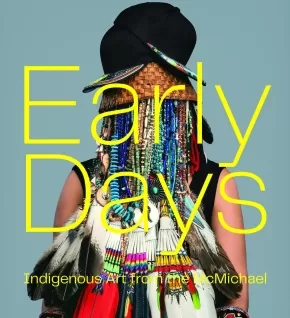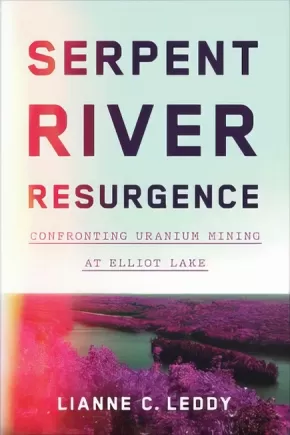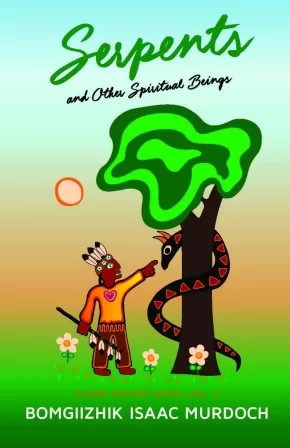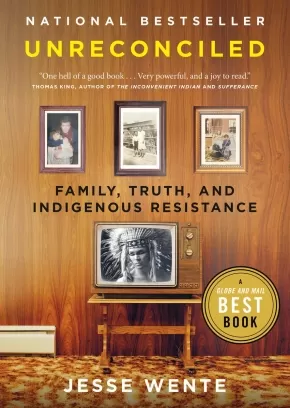
Serpent River First Nation
1
-
4
of
4 Results;
Sort By
Early Days: Indigenous Art from the McMichael
$70.00
Artists:
Format:
Hardcover
Text Content Territories:
Indigenous Canadian;
ISBN / Barcode: 9781773272337
Synopsis:
Synopsis:
A landmark publication bringing together more than seventy voices illuminating the rich array of Indigenous art held by the McMichael Canadian Art Collection.
Under the editorial direction of Anishinaabe artist and scholar Bonnie Devine, Early Days gathers the insights of myriad Indigenous cultural stakeholders, informing us on everything from goose hunting techniques, to the history of Northwest Coast mask-making, to the emergence of the Woodland style of painting and printmaking, to the challenges of art making in the Arctic, to the latest developments in contemporary art by Indigenous peoples from across Turtle Island.
Splendidly illustrated, Early Days not only tells the story of a leading collection but also traces the emergence and increasing participation of many Indigenous artists in the contemporary art world. This publication will be the largest in the history of the McMichael, and represents a vital acknowledgment of the place of Indigenous art and ways of knowing in global art history.
Featured contributors: Barry Ace, Leland Bell, Dempsey Bob, Christian Chapman, Violet Chum, Hannah Claus, Dana Claxton, Jisgang Nika Collison, Alan Corbiere, Marcia Crosby, Ruth Cuthand, Mique'l Dangeli, Joe David, Sarah Davidson, Robert Davidson, Bonnie Devine, Tarralik Duffy, Norma Dunning, David Garneau, John Geoghegan, Janice Grey, Haay'uups (Ron Hamilton), Jim Hart, Emma Hassencahl-Perley, Emily Henderson, Lynn A. Hill, Richard Hill, Maria Hupfield, Jaimie Isaac, Heather Igoliorte, Luis Jacob, Gayle Kabloona, William Kingfisher, Jessica Kotierk, Robin Laurence, Duane Linklater, Ange Loft, Tanya Lukin Linklater, Jean Marshal, Michael Massie, Gerald McMaster, Ossie Michelin, Sarah Milroy, Antoine Mountain, Nadia Myre, Jeneen Frei Njootli, Ruth Phillips, Jocelyn Piirainen, Ryan Rice, Carmen Robertson, Paul Seesequasis, Leanne Betasamosake Simpson, Wedlidi Speck, Clyde Tallio, Drew Hayden Taylor, Nakkita Trimble-Wilson, Jesse Tungilik, Camille Georgeson Usher, William Wasden Jr., Jordan Wilson, Jessica Winters.
Additional Information
400 pages | 11.00" x 10.00" | 200 Colour Photographs | Hardcover
Serpent River Resurgence: Confronting Uranium Mining at Elliot Lake
$29.95
Format:
Paperback
Text Content Territories:
Indigenous Canadian; First Nations; Anishinaabeg; Ojibway; Serpent River First Nation;
Reading Level: N/A
ISBN / Barcode: 9781442614376
Synopsis:
Synopsis:
Serpent River Resurgence tells the story of how the Serpent River Anishinaabek confronted the persistent forces of settler colonialism and the effects of uranium mining at Elliot Lake, Ontario. Drawing on extensive archival sources, oral histories, and newspaper articles, Lianne C. Leddy examines the environmental and political power relationships that affected her homeland in the Cold War period.
Focusing on Indigenous-settler relations, the environmental and health consequences of the uranium industry, and the importance of traditional uses of land and what happens when they are compromised, Serpent River Resurgence explores how settler colonialism and Anishinaabe resistance remained potent forces in Indigenous communities throughout the second half of the twentieth century.
Reviews
"Lianne C. Leddy’s book Serpent River Resurgence is a welcome addition to the conversation on mining and development in and around the Elliot Lake area. This is a must-read for any person wanting to engage in reconciliation and to understand that First Nations people have been on the frontlines of resource development and have suffered the consequences. This is a timely message for all in the era of reconciliation, and a reminder that First Nations communities have not always been properly consulted or made aware of the consequences, and have been at the whim of the Federal government. We must be reminded of our past relationships, and how we got to this point, and we need to hear the truth. This book brings to light some of the truths; it is a welcome addition to the conversation on reconciliation."— Chief Brent (Nodini’inini) Bissaillion, Chief of the Serpent River First Nation
"For anyone seeking to understand twentieth-century colonialism in Canada, this book offers a compelling on-the-ground story of resource extraction in Anishinaabek homelands. Lianne C. Leddy has done a superb job of tying together uranium demands for American weapons of war, mining boomtown development, and the rich history and culture of the Serpent River people. It is an antidote to settler narratives of progress and a vision of resilient people, land, and future."— Kim Anderson, Canada Research Chair in Indigenous Relationships and Associate Professor of Family Relations and Applied Nutrition, University of Guelph
"Serpent River Resurgence is a powerful community-based history of resilience and reclamation. Filling a critical gap in Indigenous history, Lianne C. Leddy demonstrates the impact of the global dynamics of settler colonialism during the Cold War while centring an impressive story of Indigenous resurgence."— Allan Downey, Nak'azdli Whut’en First Nation and Associate Professor of History and Indigenous Studies, McMaster University
"Of bicultural parentage, Leddy situates herself within this story as a member of both sides – Anishinaabe and Canadian. As an Indigenous environmental historian, Leddy explicates the enduring structures of settler colonialism, demonstrating that they are still in force today. To identify those structures, she adroitly deploys the words of her elders, countering their historic exclusion by inserting storytelling into her analysis, while critically approaching and analyzing bureaucratic reports and newspaper articles. A welcome and timely piece of scholarship."— Alan Ojiig Corbiere, Bne Doodem, Canada Research Chair, Indigenous History of North America, York University
"A brilliant analysis of uranium mining in Ontario which centres the lived experiences of Indigenous communities, particularly the Serpent River First Nation. Leddy explores deep-rooted Anishinaabe connections to a particular place, situating these conflicts within global processes of Cold War colonialism. Leddy argues that stories have been the foundation of Indigenous resurgence, and the stories she tells are compelling indeed."— Nancy Langston, Distinguished Professor of Environmental History, Michigan Technological University
Educator Information
Subjects: History / History of Science & Technology; History / Indigenous History; Indigenous Studies / Indigenous History; History / Canadian History; Environmental Studies
Table of Contents
Introduction
1. The Serpent River Anishinaabek before 1950
2. Carving a “Jewel in the Wilderness”: The Establishment of Elliot Lake
3. “It took all the trees”: The Cutler Acid Plant and Its Toxic Legacy
4. “We weren’t supposed to use that water at all!”: Uranium Mining and the
Serpent River
5. “Oooh yes, we all went up to Elliot to protest”: Resilience and Resistance at
Serpent River First Nation
Conclusion
Notes
Bibliography
Additional Information
248 pages | 6.00" x 9.00" | Paperback
Serpents and Other Spiritual Beings
$25.00
Format:
Paperback
Text Content Territories:
Indigenous Canadian; First Nations; Anishinaabeg; Ojibway;
Reading Level: N/A
ISBN / Barcode: 9781928120353
Synopsis:
Synopsis:
Serpents and Other Spiritual Beings is the second book in a series by renowned Ojibwe storyteller Bomgiizhik Isaac Murdoch, following on The Trail of Nenaboozhoo and Other Creation Stories (2019). Serpents and Other Spiritual Beings is a collection of traditional Ojibwe/Anishinaabe stories transliterated directly from Murdoch's oral storytelling. Part history, legend, and mythology, these are stories of tradition, magic and transformation, morality and object lessons, involving powerful spirit-beings in serpent form. The stories appear in both English and Anishinaabemowin, with translations by Patricia BigGeorge. Murdoch's traditional-style Ojibwe artwork provides beautiful illustrations throughout.
Reviews
"'When the Thunderbirds and Serpents fight, they feed off each other, you know great medicine gets cast across the land. We get our life from that.' So writes storyteller Isaac Murdoch as he shares his Elders' stories about tunnels beneath the earth, rich laws, philosophies, teachings, power from up there, down there, and all around us, until we too hear the thunders as they bring us into the world of wahkotowin, all our relations. How privileged and blessed we are to be able to read the Ahtyokaywina of our people."--Maria Campbell, author of Halfbreed
"Gather around, for here are oral stories transcribed so they retain the flavour of a narrative spoken aloud, and translated into Anishinaabemowin; perfect for language-learners. I love the way these stories infuse the spirit world into an every-day context, these are not dusty old legends, but a living way of seeing the world around us in the here and now."--Nathan Niigan Noodin Adler, author of Ghost Lake
Educator & Series Information
Dual-Language: English and Anishinaabemowin.
Anishinaabemowin translation by Patricia BigGeorge, who is an Anishinaabemowin speaker and translator.
This book is Vol. 2 in the Ojibwe History Series.
Additional Information
100 pages | 5.50" x 8.50" | 20 illustrations | Paperback
Unreconciled: Family, Truth, and Indigenous Resistance (PB)
$22.00
Format:
Paperback
Text Content Territories:
Indigenous Canadian; First Nations; Anishinaabeg; Ojibway; Serpent River First Nation;
Reading Level: N/A
ISBN / Barcode: 9780735235755
Synopsis:
Synopsis:
A prominent Indigenous voice uncovers the lies and myths that affect relations between white and Indigenous peoples and the power of narrative to emphasize truth over comfort.
Part memoir and part manifesto, Unreconciled is a stirring call to arms to put truth over the flawed concept of reconciliation and to build a new, respectful relationship between the nation of Canada and Indigenous peoples.
Jesse Wente remembers the exact moment he realized that he was a certain kind of Indian--a stereotypical cartoon Indian. He was playing softball as a child when the opposing team began to war-whoop when he was at bat. It was just one of many incidents that formed Wente's understanding of what it means to be a modern Indigenous person in a society still overwhelmingly colonial in its attitudes and institutions.
As the child of an American father and an Anishinaabe mother, Wente grew up in Toronto with frequent visits to the reserve where his maternal relations lived. By exploring his family's history, including his grandmother's experience in residential school, and citing his own frequent incidents of racial profiling by police who'd stop him on the streets, Wente unpacks the discrepancies between his personal identity and how non-Indigenous people view him.
Wente analyzes and gives voice to the differences between Hollywood portrayals of Indigenous peoples and lived culture. Through the lens of art, pop culture, and personal stories, and with disarming humour, he links his love of baseball and movies to such issues as cultural appropriation, Indigenous representation and identity, and Indigenous narrative sovereignty. Indeed, he argues that storytelling in all its forms is one of Indigenous peoples' best weapons in the fight to reclaim their rightful place.
Wente explores and exposes the lies that Canada tells itself, unravels "the two founding nations" myth, and insists that the notion of "reconciliation" is not a realistic path forward. Peace between First Nations and the state of Canada can't be recovered through reconciliation--because no such relationship ever existed.
Reviews
"Unreconciled is one hell of a good book. Jesse Wente’s narrative moves effortlessly from the personal to the historical to the contemporary. Very powerful, and a joy to read."—Thomas King, author of The Inconvenient Indian and Sufferance
“With Unreconciled, Jesse Wente proves himself to be one of the most influential Anishinaabe thinkers of our time. By telling his own story, Jesse provides Canada with an essential roadmap of how to move forward through the myth of reconciliation towards the possibility of a just country. There is much work to be done but reading Jesse’s words, soaking them in and letting them settle in your mind, will set us all on the right path.”—Tanya Talaga, bestselling author of Seven Fallen Feathers
“Mahsi cho, Jesse Wente, for illuminating the biggest issue facing Canada’s relationship with Indigenous people: Canada fears Indigenous people because Canada is terrified of our power. Each language class, culture camp, graduation ceremony, each Supreme Court Ruling, each Treaty (that wasn't forged), each feast and naming ceremony… is part of the incredible Reclaiming happening right now. Please read this book. It's an infuriating read but a necessary one.”—Richard Van Camp, author of The Lesser Blessed and Moccasin Square Gardens
"With Unreconciled, Jesse Wente proves he's a storyteller through and through—one who is unafraid of telling hard but necessary truths, yes, but also one who knows that vulnerability is the quickest way to the heart. Wente shares so generously with his readers in this book, braiding together his own past with the problems of the present, ultimately offering us a way forward, together."—Alicia Elliott, author of A Mind Spread Out on the Ground
Additional Information
208 pages | 5.10" x 7.98" | Paperback
Sort By










